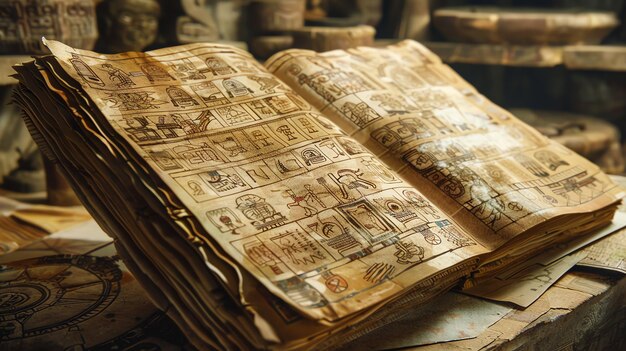
History is much more than just a collection of dates, events, and figures. It is the story of humanity—our triumphs, our failures, and the choices that have shaped the world we live in today. Yet, much of this story remains shrouded in mystery, waiting to be uncovered. Whether through ancient artifacts, forgotten civilizations, or unsolved historical enigmas, the past holds valuable lessons that continue to resonate with us. By exploring history’s mysteries, we not only gain insight into our origins but also unlock lessons that can guide us toward a better future.
The Allure of Historical Mysteries
History is full of unsolved mysteries that intrigue and captivate. From the lost city of Atlantis to the fate of the Lost Colony of Roanoke, these enigmas spark our imagination and curiosity. These mysteries may seem distant or abstract, but they are reminders that our understanding of the past is never complete. History is constantly evolving, with new discoveries shedding light on forgotten stories or challenging our long-held assumptions.
The allure of historical mysteries is part of what makes studying history so fascinating. Every artifact or unearthed document holds the potential to change our understanding of the past, offering us new perspectives on old events. These mysteries also serve as a reflection of our own search for meaning in the world around us, helping us make sense of the complexities of human experience.
Learning from Ancient Civilizations
One of the most significant lessons we can glean from history comes from the rise and fall of ancient civilizations. The achievements and failures of societies like Ancient Egypt, Mesopotamia, the Roman Empire, and the Maya serve as a rich source of reflection on the cycles of human progress. These civilizations left behind monumental structures, written records, and cultural innovations that provide insight into the values, philosophies, and technologies of their time.
For example, the construction of the Great Pyramids of Giza in Egypt reflects the incredible organizational skills and engineering prowess of ancient Egyptians. However, the eventual decline of ancient Egypt, coupled with the fall of powerful empires throughout history, offers a sobering reminder of the vulnerability of even the most advanced societies.
The Maya civilization, known for its advanced understanding of astronomy and mathematics, also faced a mysterious collapse in the 9th century. While the exact cause remains a topic of debate, theories suggest that environmental factors, warfare, and social unrest played a role. This mystery reminds us of the importance of environmental stewardship, sustainable resource management, and the potential consequences of social and political instability.
The Role of Conflict in Shaping History
Wars and conflicts have undeniably shaped the trajectory of human history. From the ancient battles of Mesopotamia to the World Wars of the 20th century, conflict has often been a catalyst for change, whether through the reshaping of borders, the rise of new powers, or the advancement of technologies. However, war also leaves behind profound lessons about the human cost of violence, the fragility of peace, and the need for diplomacy.
World War I and II, for instance, taught us the devastating consequences of unchecked nationalism, totalitarianism, and the failure to address underlying tensions through diplomacy. The Holocaust, one of the darkest chapters in history, serves as a powerful reminder of the dangers of intolerance, racism, and the dehumanization of others. The lessons learned from these tragedies underscore the need to foster global cooperation, promote human rights, and prevent the conditions that lead to such horrors.
At the same time, wars have also prompted remarkable technological advancements. The development of radar, antibiotics, and nuclear energy during World War II, for example, dramatically changed the course of history. Yet, this progress also poses ethical questions about the use of such technologies and the responsibility that comes with them.
The Power of Personal Stories in History
History is often told through the lens of leaders, wars, and grand events, but the personal stories of ordinary people offer just as much value. By studying the lives of individuals from history—whether through diaries, letters, or oral histories—we gain a deeper understanding of the human experience. These stories remind us that history is not just about the decisions made by kings and generals but about the lives of the countless men, women, and children who lived through these times.
The stories of enslaved people, for example, reveal the resilience, strength, and agency of those who fought for freedom in the face of unimaginable adversity. The letters and diaries from soldiers in wars, immigrants seeking new lives, and everyday people enduring hardship all serve to humanize history and make it more relatable.
By listening to the voices of those who lived through history, we not only gain empathy but also learn from their struggles and triumphs. These personal accounts help us understand the complexities of life in different times and cultures, offering wisdom about resilience, community, and the power of hope.
Technology: A Double-Edged Sword
As history moves forward, the role of technology becomes increasingly significant. Throughout history, technological innovations have reshaped industries, communication, and warfare. The invention of the printing press in the 15th century revolutionized the spread of information, while the Industrial Revolution transformed economies and societies. Today, we are living through another technological revolution, driven by the digital age and artificial intelligence.
However, as history has shown, technological advancements often come with unintended consequences. The same printing press that democratized information also facilitated the spread of propaganda. The Industrial Revolution brought about incredible economic growth but also led to harsh working conditions, environmental degradation, and social inequality. Today, we must confront similar challenges with the rise of automation and artificial intelligence, which promise efficiency but also raise concerns about job displacement and privacy.
By reflecting on how technology has shaped history, we can better understand the need for ethical decision-making in the development and use of new technologies. Just as earlier societies grappled with the impact of their inventions, we must consider the long-term implications of today’s technologies and ensure they serve humanity’s greater good.
History as a Guide for the Future
Ultimately, history’s mysteries are not just about uncovering facts or solving puzzles; they are about understanding the lessons the past has to offer. Every civilization, conflict, innovation, and individual story contributes to the broader narrative of humanity’s growth and evolution. By studying history, we gain not only knowledge but wisdom—insight into how societies function, how humans interact, and how we can avoid repeating the mistakes of the past.
As we look to the future, the lessons from history remind us that while we may have advanced technologically, the core challenges we face—such as inequality, environmental degradation, and the need for global cooperation—are not new. History provides a roadmap for tackling these challenges, as well as a reminder of what happens when we ignore the lessons it offers.
The mysteries of history may never be fully solved, but the quest for understanding allows us to learn from our ancestors and create a better world for future generations. By uncovering these mysteries, we not only gain knowledge of our past but also the tools to navigate the complexities of the future.



